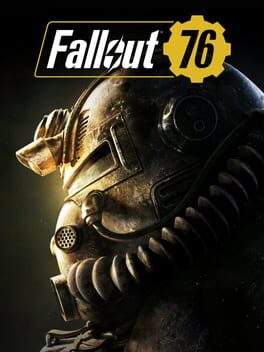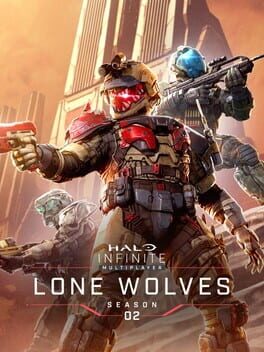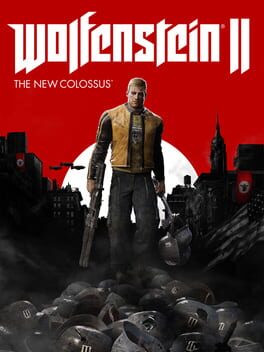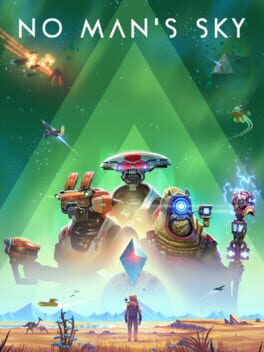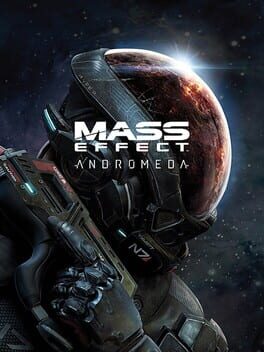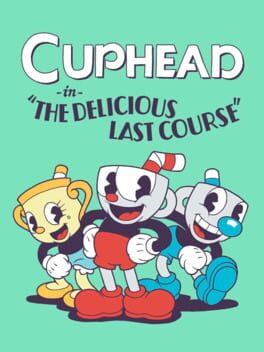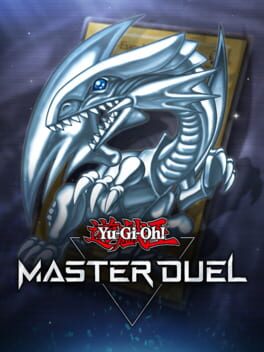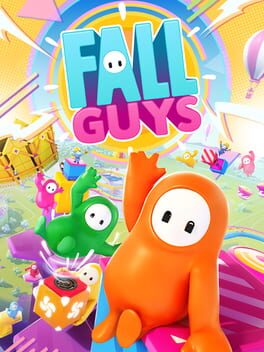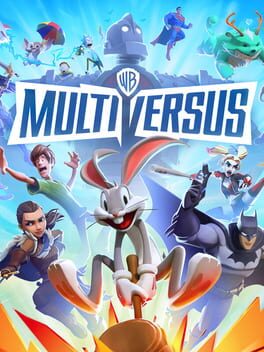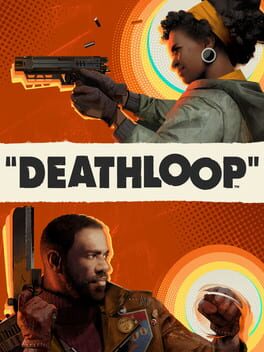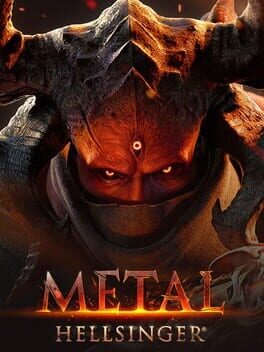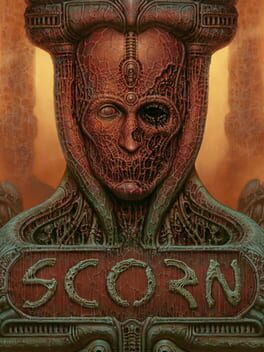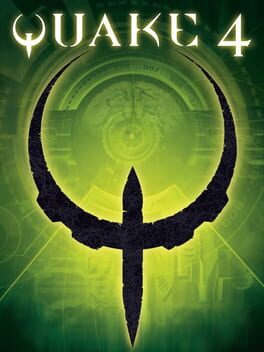HaroKid
2018
An online multiplayer spin-off of a traditionally very single-player driven game that seems determined to make you play solo anyway. With how limited and pointless group questing is, the decision to back off of the original vision of having no NPCs comes across as reactionary and having no confidence in what little vision this game ever had.
I experienced only one technical issue, but even without being marred by game breaking bugs, Fallout 76's allure is at best mindless, atmosphereless, storyless, junkfood and a way to shoot the shit for a few hours with a friend.
I experienced only one technical issue, but even without being marred by game breaking bugs, Fallout 76's allure is at best mindless, atmosphereless, storyless, junkfood and a way to shoot the shit for a few hours with a friend.
2021
MachineGame's penchant for shocking, weird, and effective storytelling methods remain consistent from Wolfenstein II's predecessor right up until it's abrupt anti-climax, while the level and combat design take a notable dip in quality as many systems feel incomplete and at odds with one another.
It's no Doom; A fine, if not wholly complete cinematic adventure that's probably best enjoyed on difficulty settings where the game asks less of the player.
It's no Doom; A fine, if not wholly complete cinematic adventure that's probably best enjoyed on difficulty settings where the game asks less of the player.
2016
On the surface, it seems as though a lot of time was put into Andromeda's various systems on an individual level, but very little effort is present in the way of making them flow into one another to create something resembling a fun gameplay loop worth spending time in.
The graphical fidelity and audio design is a welcome leap from the trilogy, but lack of interesting presentation or varied combat squanders any goodwill they might instill. Combat is more open ended and expressive on paper, but the chunky nature of navigating menus, managing your loadout, basic AI, and over-long animations prevent it from being as liberating as it ought to be.
Dialogue and performances from the supporting cast are mostly fine, but just about everything that comes out of Ryder's mouth happens at unnatural pacing and feels bizarrely divorced from anything resembling a real conversation. More unforgivable is the lack of any intrigue or memorable characters, with just about every story element being a discounted echo of something from the original trilogy, and even spilling over into feeling like a generic Destiny/Halo type story at times.
Underneath all of Andromeda's flaws, something resembling a good game is almost there, but it's buried under 20 tons of fat and loading screens. One could almost take a look at the horrendously bloated open world hubs filled with repetitive encounters and barebones production value in the story department, and wonder: Why was Mass Effect Andromeda's blank slate stepping-stone for the franchise developed by the team behind Mass Effect 3's multiplayer component not EA's attempt at a Destiny-clone, instead of the ill-fated Anthem?
I'm sympathetic towards many of the game's shortcomings and development issues under EA - But a lot of the problems here seem self-inflicted. At the end of the day, had Mass Effect Andromeda landed every shot it took, it would still be a poster-child for tired and overly long open world bloat that just about every other AAA game at the time was afflicted with. No one aspect of it is so offensively bad it tanks the experience as a whole; It's all just so mind-numbingly boring.
The graphical fidelity and audio design is a welcome leap from the trilogy, but lack of interesting presentation or varied combat squanders any goodwill they might instill. Combat is more open ended and expressive on paper, but the chunky nature of navigating menus, managing your loadout, basic AI, and over-long animations prevent it from being as liberating as it ought to be.
Dialogue and performances from the supporting cast are mostly fine, but just about everything that comes out of Ryder's mouth happens at unnatural pacing and feels bizarrely divorced from anything resembling a real conversation. More unforgivable is the lack of any intrigue or memorable characters, with just about every story element being a discounted echo of something from the original trilogy, and even spilling over into feeling like a generic Destiny/Halo type story at times.
Underneath all of Andromeda's flaws, something resembling a good game is almost there, but it's buried under 20 tons of fat and loading screens. One could almost take a look at the horrendously bloated open world hubs filled with repetitive encounters and barebones production value in the story department, and wonder: Why was Mass Effect Andromeda's blank slate stepping-stone for the franchise developed by the team behind Mass Effect 3's multiplayer component not EA's attempt at a Destiny-clone, instead of the ill-fated Anthem?
I'm sympathetic towards many of the game's shortcomings and development issues under EA - But a lot of the problems here seem self-inflicted. At the end of the day, had Mass Effect Andromeda landed every shot it took, it would still be a poster-child for tired and overly long open world bloat that just about every other AAA game at the time was afflicted with. No one aspect of it is so offensively bad it tanks the experience as a whole; It's all just so mind-numbingly boring.
2022
The unique visuals and pleasant audio are surefire wins, but I was surprised at how Tunic's gameplay loop was able to sink its hooks into me; Though I usually dislike games that are purposefully secretive about their mechanics, the implementation of Tunic's Secrets is among the most satisfying I have ever experienced in a video game - You can somehow feel like a genius for discovering something that was in front of you the whole time, even if it took you in excess of an hour to do so.
An obvious loveletter to the likes of Zelda and Dark Souls - It's almost a mystery as to why it connected with me as well as it did, considering I have no love nor experience with those titles.
An obvious loveletter to the likes of Zelda and Dark Souls - It's almost a mystery as to why it connected with me as well as it did, considering I have no love nor experience with those titles.
The Delicious Last Course dials up the creativity, challenge, and artistry in a game that was already filled to the brim with these qualities. Its climax is not as explosive or rewarding, but the new parry challenges and map puzzles give the new DLC Island its own pleasant identity and pace compared to the base game.
The biggest additions from The Delicious Last Course are the ones that permeate the rest of the game: New weapons, new charms, a brand new playable character, and a new (If not as good) title screen theme add plenty of variety and breath new strategies to the base game's previously established levels.
For such a low buy-in, Cuphead: The Delicious Last Course can easily be called essential for anyone with enthusiasm for the original.
The biggest additions from The Delicious Last Course are the ones that permeate the rest of the game: New weapons, new charms, a brand new playable character, and a new (If not as good) title screen theme add plenty of variety and breath new strategies to the base game's previously established levels.
For such a low buy-in, Cuphead: The Delicious Last Course can easily be called essential for anyone with enthusiasm for the original.
How much you enjoy Master Duel will probably enjoy how much you enjoy honest to god modern day YGO, for better or for worse.
The aesthetic leaning into the more Hearthstone/Magic Arena realm and away from the sleek futuristic cyber nonsense of Duel Links is understandable, but also disappointing; Yes, the anime and card games are related, but wholly enjoyable on their own individual merits. Still, it feels like Master Duel is almost afraid of YGO's own branding and legacy at times, gimmicky pets and the usual card pool aside.
Master Duel's usability is also not as great as any of Hearthstone's, Magic Arena's, or even Duel Links'. Navigating menus is clunky and slow, as is passing through the different turn phases, and features such as highlighted ability triggers on a chain (Like Magic Arena) are sorely missed.
Again, this is all mostly bearable depending on how much you like modern day YGO. I find the base ruleset to be perfectly good and fine, but the lack of different matchmaking options (Rank vs Unranked) or different formats - Things like Modern, Oldschool, Draft, or even Speed Duels - makes playing online with strangers an absolute chore once you reach a high enough rank when your opponents are ones with access to any number of archetypes that have boatloads of protection, removal, negation, and special summons that drag a single turn out into 5 minutes of sequence playing solitaire.
[As an aside from Master Duel in specific and more on the game of Yu-Gi-Oh itself, I have often heard some longtime YGO prolifics talk about how fast the speed of the game is. It probably is true in terms of per-match time or total turn count that YGO games are shorter than other games in the genre, but I found while playing Master Duel that in half of my games each of those turns takes so much longer and is very much less interactive than in any other card game I've played. When this happens and it's not your turn, a match that's literally half the length of a bout in [Other Card Game] feels twice as long.]
If that's your thing, then, cool. The YGO card game fanbase is a big one, and it's almost a wonder why it took so long for something like Master Duel to come along. The biggest piece of admiration I can have for this online iteration of the card game is the sheer breadth of cards available from the getgo, either in packs or by way of the game's card crafting system; Only about one card I searched for in the deck editor didn't show up. Even being older than 20 years old, the effort to implement this library of game pieces is appreciated, and something more games could stand to do. Being able to look up your favorite card from when you were younger and play with it has a great satisfaction to it. But I don't see myself seriously returning and investing more hours until more formats/playlists are available unless I'm playing with friends.
On its surface, Master Duel is a gateway for new players to enter the world of Real Ass Yu-Gi-Oh!, much like Hearthstone and Magic Arena were able to make complex card games accessible to the masses in the past. It technically serves that function, especially with it being free-to-play and on just about everything, but I have a hard time having a lot of faith or enthusiasm in it as an effective onboarding experience for anyone without a previous interest in the property.
The aesthetic leaning into the more Hearthstone/Magic Arena realm and away from the sleek futuristic cyber nonsense of Duel Links is understandable, but also disappointing; Yes, the anime and card games are related, but wholly enjoyable on their own individual merits. Still, it feels like Master Duel is almost afraid of YGO's own branding and legacy at times, gimmicky pets and the usual card pool aside.
Master Duel's usability is also not as great as any of Hearthstone's, Magic Arena's, or even Duel Links'. Navigating menus is clunky and slow, as is passing through the different turn phases, and features such as highlighted ability triggers on a chain (Like Magic Arena) are sorely missed.
Again, this is all mostly bearable depending on how much you like modern day YGO. I find the base ruleset to be perfectly good and fine, but the lack of different matchmaking options (Rank vs Unranked) or different formats - Things like Modern, Oldschool, Draft, or even Speed Duels - makes playing online with strangers an absolute chore once you reach a high enough rank when your opponents are ones with access to any number of archetypes that have boatloads of protection, removal, negation, and special summons that drag a single turn out into 5 minutes of sequence playing solitaire.
[As an aside from Master Duel in specific and more on the game of Yu-Gi-Oh itself, I have often heard some longtime YGO prolifics talk about how fast the speed of the game is. It probably is true in terms of per-match time or total turn count that YGO games are shorter than other games in the genre, but I found while playing Master Duel that in half of my games each of those turns takes so much longer and is very much less interactive than in any other card game I've played. When this happens and it's not your turn, a match that's literally half the length of a bout in [Other Card Game] feels twice as long.]
If that's your thing, then, cool. The YGO card game fanbase is a big one, and it's almost a wonder why it took so long for something like Master Duel to come along. The biggest piece of admiration I can have for this online iteration of the card game is the sheer breadth of cards available from the getgo, either in packs or by way of the game's card crafting system; Only about one card I searched for in the deck editor didn't show up. Even being older than 20 years old, the effort to implement this library of game pieces is appreciated, and something more games could stand to do. Being able to look up your favorite card from when you were younger and play with it has a great satisfaction to it. But I don't see myself seriously returning and investing more hours until more formats/playlists are available unless I'm playing with friends.
On its surface, Master Duel is a gateway for new players to enter the world of Real Ass Yu-Gi-Oh!, much like Hearthstone and Magic Arena were able to make complex card games accessible to the masses in the past. It technically serves that function, especially with it being free-to-play and on just about everything, but I have a hard time having a lot of faith or enthusiasm in it as an effective onboarding experience for anyone without a previous interest in the property.
2020
2022
2021
Immersive-Sim, Search-Action, or Metroidvania - All are probably apt-enough descriptions for game like this, especially since the studio behind it has so much of their past Dishonored and even Prey DNA blaringly present throughout many of it's avenues - And yet, unexpectedly I find myself being most emotionally recalled to playing and replaying endless Super Mario World levels as I stocked up on extra lives, Yoshis, and powerups, or trying to perfect a run through the robot masters in any given Mega Man title when I play Arkane Lyon's "DEATHLOOP".
(Henceforth) Deathloop is a clever and stylish shooter packed to the rim with gimmicks that may have been better served with brevity. The premise of "Groundhog's Day With Guns" as a video game is certainly tantalizing, and one or both of Arkane's studios are clear picks for the task even prior to Deathloop's actualization. There are moments where the game shines and lives up to this premise, though I'm not sure they quite stuck the landing.
First, the positives - Deathloop's production design from the art direction to the music is intentful, impactful, and fun. The game only really has one song that I can recall outside of the Bond-esque credit sequence, but the dynamic implementation of it and its different contexts makes it exciting and memorable. Weapons are weird, probably nonsensical in mechanical design, and fit right in with the highly accessorized 1960's plastic fashion aesthetic that permeates Blackreef Isle. The between-levels UI pulls from some of the worst offenders in the AAA space as far as functionality goes but stylistically its all cohesive and blends the game's 3D world with the fun 2D animatics after each main objective. Take a drink for every time I draw comparison to another Arkane game, but if the drab smog and dust of the Dishonored franchise tired you out as much as it did me, Deathloop is a breath of fresh air.
What becomes a little more stale a bit too quickly is much of the core gameplay; Despite the game's own insistence that you "Play Your Own Way", I was surprised at how much more restrictive Deathloop's sandbox really is in practice. Each level has alternate routes and secrets like you would expect, and much of the game can be played "out of order", like the aforementioned Mega Man robot masters, but the initial promise of a timeloop puzzle where you manage daylight and have to manipulate your assassination targets is pretty much immediately reduced to there being only a single path forward that the game is not in the slightest shy to tell you about.
In Prey or Dishonored, one conceivably could not play and see all the game had the offer on a single playthrough - There were just too many options that were mutually exclusive. This is vital to that Immersive-Sim experience, and what lends the sheer amount of player agency and emergent moments that practically define the sub-genre. Deathloop's primary gimmick is an interesting experiment in that sense, as it brings that meta-game aspect into the primary experience. For better or for worse, this feels like a move not to ensure that the average player will get to see everything the developers worked on - Though that's probably a nice bonus - but rather a move to force players to feel confident enough to experiment around, while also enabling more players to enjoy this type of game in the "correct way". These goals are admirable, however I think it speaks for itself as to why that doesn't work out as much in practice. At least, not for myself, who was elated by Prey 2017's open-ness and environment of fear and uncertainty, and the much greater amount of pay-off that solving problems in that title brought. For the type of player who is maybe new to the sub-genre or is only interested in watching the credits roll a single time, no matter the game, this probably works out just fine.
One aspect that motivates the loop mechanic and is ultimately counterintuitive to what its goals may be is the game's punishment for failure. In previous titles, the onus is on the player to save and reload how they
I suspect that Arkane Lyon actually achieved more or less 100% what they set out to do. Given the context of not just Arkane, but Bethesda and Zenimax as a whole, I can't help but wonder how many of these decisions were made with the influence of financial pressure. Prior to Deathloop, the first Dishonored game seems to have been the only big hit in Arkane's library, with Prey notably underperforming. Combined with a shift to the ever present GaaS model and hyper aggressive monetization schemes, Zenimax's willingness to shop out timed exclusivity deals for Sony's new console before being bought out by Microsoft shows that they may not have had the cushiest of cash piles. Integrated tech demos for the DualSense gimmicks aside, I don't believe or feel that Arkane's vision was compromised by Sony or higher up Zenimax, but it does feel markedly different in approach.
On a technical level, Deathloop Ideally looks fantastic in motion, but maybe the game's most fatal flaw is the horrendous PC version performance. Even on a contemporary high-end machine, most if not all settings had to be knocked down a few notches to maintain a solid 60 frames per second, but most grievous is the seemingly common issue of stuttering and freezing found, regardless of what your video settings are at. This effect usually subsides after you've spent a minute or two in a newly loaded map, but will often rear its ugly head when transitioning between indoor and outdoor areas.
The TL:DR - Deathloop is a fun, but ultimately shallow ride that gives the player all the answers, never really lets the player screw up and snowball into interesting scenarios, and somehow paradoxically forces you to “Play Your Way” instead of just… Letting you play? Probably a whole lot more approachable, but not nearly as satisfying or replayable as the rest of the studio's games.
(Henceforth) Deathloop is a clever and stylish shooter packed to the rim with gimmicks that may have been better served with brevity. The premise of "Groundhog's Day With Guns" as a video game is certainly tantalizing, and one or both of Arkane's studios are clear picks for the task even prior to Deathloop's actualization. There are moments where the game shines and lives up to this premise, though I'm not sure they quite stuck the landing.
First, the positives - Deathloop's production design from the art direction to the music is intentful, impactful, and fun. The game only really has one song that I can recall outside of the Bond-esque credit sequence, but the dynamic implementation of it and its different contexts makes it exciting and memorable. Weapons are weird, probably nonsensical in mechanical design, and fit right in with the highly accessorized 1960's plastic fashion aesthetic that permeates Blackreef Isle. The between-levels UI pulls from some of the worst offenders in the AAA space as far as functionality goes but stylistically its all cohesive and blends the game's 3D world with the fun 2D animatics after each main objective. Take a drink for every time I draw comparison to another Arkane game, but if the drab smog and dust of the Dishonored franchise tired you out as much as it did me, Deathloop is a breath of fresh air.
What becomes a little more stale a bit too quickly is much of the core gameplay; Despite the game's own insistence that you "Play Your Own Way", I was surprised at how much more restrictive Deathloop's sandbox really is in practice. Each level has alternate routes and secrets like you would expect, and much of the game can be played "out of order", like the aforementioned Mega Man robot masters, but the initial promise of a timeloop puzzle where you manage daylight and have to manipulate your assassination targets is pretty much immediately reduced to there being only a single path forward that the game is not in the slightest shy to tell you about.
In Prey or Dishonored, one conceivably could not play and see all the game had the offer on a single playthrough - There were just too many options that were mutually exclusive. This is vital to that Immersive-Sim experience, and what lends the sheer amount of player agency and emergent moments that practically define the sub-genre. Deathloop's primary gimmick is an interesting experiment in that sense, as it brings that meta-game aspect into the primary experience. For better or for worse, this feels like a move not to ensure that the average player will get to see everything the developers worked on - Though that's probably a nice bonus - but rather a move to force players to feel confident enough to experiment around, while also enabling more players to enjoy this type of game in the "correct way". These goals are admirable, however I think it speaks for itself as to why that doesn't work out as much in practice. At least, not for myself, who was elated by Prey 2017's open-ness and environment of fear and uncertainty, and the much greater amount of pay-off that solving problems in that title brought. For the type of player who is maybe new to the sub-genre or is only interested in watching the credits roll a single time, no matter the game, this probably works out just fine.
One aspect that motivates the loop mechanic and is ultimately counterintuitive to what its goals may be is the game's punishment for failure. In previous titles, the onus is on the player to save and reload how they
I suspect that Arkane Lyon actually achieved more or less 100% what they set out to do. Given the context of not just Arkane, but Bethesda and Zenimax as a whole, I can't help but wonder how many of these decisions were made with the influence of financial pressure. Prior to Deathloop, the first Dishonored game seems to have been the only big hit in Arkane's library, with Prey notably underperforming. Combined with a shift to the ever present GaaS model and hyper aggressive monetization schemes, Zenimax's willingness to shop out timed exclusivity deals for Sony's new console before being bought out by Microsoft shows that they may not have had the cushiest of cash piles. Integrated tech demos for the DualSense gimmicks aside, I don't believe or feel that Arkane's vision was compromised by Sony or higher up Zenimax, but it does feel markedly different in approach.
On a technical level, Deathloop Ideally looks fantastic in motion, but maybe the game's most fatal flaw is the horrendous PC version performance. Even on a contemporary high-end machine, most if not all settings had to be knocked down a few notches to maintain a solid 60 frames per second, but most grievous is the seemingly common issue of stuttering and freezing found, regardless of what your video settings are at. This effect usually subsides after you've spent a minute or two in a newly loaded map, but will often rear its ugly head when transitioning between indoor and outdoor areas.
The TL:DR - Deathloop is a fun, but ultimately shallow ride that gives the player all the answers, never really lets the player screw up and snowball into interesting scenarios, and somehow paradoxically forces you to “Play Your Way” instead of just… Letting you play? Probably a whole lot more approachable, but not nearly as satisfying or replayable as the rest of the studio's games.
2022
A neat NuDOOM tribute cleverly combined with a rhythm game - A match so natural you don't really think twice about it. Its brevity serves it well and is just engaging enough for its runtime, even if it's bloated and unstimulating motion graphics cutscenes feel like week-long each.
I suspect your enjoyment level will depend on your taste in music; The vast majority of it was definitely serviceable, but I've already forgotten all of it. Unfortunately for being a rhythm game, it fairly quickly becomes static feeling without any exciting or unexpected rhythms. This consistency is probably for the best given you still need to focus on blasting, and yet I find myself disappointed anyway. Each song, and therefore each level ends up feeling more or less the same, which is then compounded by the lack of varied boss fights.
The most surprising thing about this was hearing the System of a Down dude. Worth a download and a session or two in which you'll probably finish the game, but not much else.
I suspect your enjoyment level will depend on your taste in music; The vast majority of it was definitely serviceable, but I've already forgotten all of it. Unfortunately for being a rhythm game, it fairly quickly becomes static feeling without any exciting or unexpected rhythms. This consistency is probably for the best given you still need to focus on blasting, and yet I find myself disappointed anyway. Each song, and therefore each level ends up feeling more or less the same, which is then compounded by the lack of varied boss fights.
The most surprising thing about this was hearing the System of a Down dude. Worth a download and a session or two in which you'll probably finish the game, but not much else.
2022
Scorn is frustrating, because it's almost quite good.
With how striking the whole of the game's atmosphere is in the audio and visuals, it's very apparent this was the bulk of the game's focus. There's a pleasant restraint with the puzzles in that they do not feel so overly clever nor very explicitly explained - Though they could be more involved, and there's a handful of instances of tedious map scraping to make sure you've explored every possible solution, (Especially if you're playing on the extremely poorly supported Ultrawide mode which crops your view) generally the pace is kept going so that Scorn can immerse you in its upsetting environments and tell it's completely non-verbal story.
...Until that pace is often brought to a screeching halt by the game's combat sections. Scorn's combat itself isn't the worst, but even for a survival horror approach, feels unbalanced thanks to clunky item swapping, poor communication on how items function, and unsanctionable checkpointing system. - I appreciate the game's commitment to feeling alien and otherworldly with its lack of dialogue, semi-internal penises, and strictly foreign UI and iconography, but I would have hoped the encounter design would at least subtley-but-not-too-subtley explain how it wants you to play. Despite the slog, there are some very excellent stretches here; Enough to give you hope, but not enough to completely turn things around.
Scorn could be greatly improved with a single patch that addresses some of the game's balance and features like Ultrawide support or an FoV slider. As far as I can tell, this is Ebb Software's debut title and though it's uneven throughout, it is nonetheless impressive. Looking back at my screenshots and video clips, it looks even better than I remembered while in-game, and performance was excellent without as much as a single technical mishap. Scenes are consistently framed with an extreme amount of consideration and detail, you could sell me a photobook of just in-game screenshots, and It's not a game I think I will be mentally offloading wholesale any time soon.
All of Scorn's seams really lie with a small handful of very important design decisions that should have gone the other way. I'm eagerly looking forward to whatever this development team has in store next, and I'm not even sure I need it to have either puzzles or combat.
With how striking the whole of the game's atmosphere is in the audio and visuals, it's very apparent this was the bulk of the game's focus. There's a pleasant restraint with the puzzles in that they do not feel so overly clever nor very explicitly explained - Though they could be more involved, and there's a handful of instances of tedious map scraping to make sure you've explored every possible solution, (Especially if you're playing on the extremely poorly supported Ultrawide mode which crops your view) generally the pace is kept going so that Scorn can immerse you in its upsetting environments and tell it's completely non-verbal story.
...Until that pace is often brought to a screeching halt by the game's combat sections. Scorn's combat itself isn't the worst, but even for a survival horror approach, feels unbalanced thanks to clunky item swapping, poor communication on how items function, and unsanctionable checkpointing system. - I appreciate the game's commitment to feeling alien and otherworldly with its lack of dialogue, semi-internal penises, and strictly foreign UI and iconography, but I would have hoped the encounter design would at least subtley-but-not-too-subtley explain how it wants you to play. Despite the slog, there are some very excellent stretches here; Enough to give you hope, but not enough to completely turn things around.
Scorn could be greatly improved with a single patch that addresses some of the game's balance and features like Ultrawide support or an FoV slider. As far as I can tell, this is Ebb Software's debut title and though it's uneven throughout, it is nonetheless impressive. Looking back at my screenshots and video clips, it looks even better than I remembered while in-game, and performance was excellent without as much as a single technical mishap. Scenes are consistently framed with an extreme amount of consideration and detail, you could sell me a photobook of just in-game screenshots, and It's not a game I think I will be mentally offloading wholesale any time soon.
All of Scorn's seams really lie with a small handful of very important design decisions that should have gone the other way. I'm eagerly looking forward to whatever this development team has in store next, and I'm not even sure I need it to have either puzzles or combat.
2005
Forget not offering a single interesting idea done better than other mid-2000's FPS contemporaries like Half-Life 2, Halo 2, or even this title's own cousin in Doom 3; Quake 4 in a vacuum has no soul, no atmosphere, and not a single thing in its favor beyond being technically competent.
The phrase "This looks like a fake video game" is perhaps overused, but never have I felt so strongly that this was the case as I have with Quake 4. It's an A.I.'s idea of what a video game is, so much so that it might not even have enough flavor to be slotted into a 4 second shot in an episode of CSI. It's a 7 hour slog of what is essentially a child playing with the dullest set action figures as possible. It's like fast-forwarding past all of the fun satire and charming production design of Paul Verhoeven's Starship Troopers film so you can watch the last 20 minutes of overly bloated alien shooting at 0.5x speed.
Quake 4 is all of these things, and ultimately somehow is a complete Nothing video game. The setting and plot are less inspired than Brute Force and it fails to follow up on any of Doom 3's ideas or technology to such a degree that in hindsight I'm tempted to think I was too harsh on that game.
Sure, it doesn't brick my hard drive, the guns do damage and make sound, and playing Quake 4 doesn't kill my cat, but I'm convinced the only thing notable about this game and the only reason anyone gives it any thought is the fact that it says "Quake" on the box and that Raven Software and id Software are otherwise known for video games that actually engage on some level and have sparked joy and innovation.
I'd like to say something witty like "more like Quake 4 out of 10." but astonishingly, it does not even reach those heights.
Quake 4 is a video game for people without tastebuds.
The phrase "This looks like a fake video game" is perhaps overused, but never have I felt so strongly that this was the case as I have with Quake 4. It's an A.I.'s idea of what a video game is, so much so that it might not even have enough flavor to be slotted into a 4 second shot in an episode of CSI. It's a 7 hour slog of what is essentially a child playing with the dullest set action figures as possible. It's like fast-forwarding past all of the fun satire and charming production design of Paul Verhoeven's Starship Troopers film so you can watch the last 20 minutes of overly bloated alien shooting at 0.5x speed.
Quake 4 is all of these things, and ultimately somehow is a complete Nothing video game. The setting and plot are less inspired than Brute Force and it fails to follow up on any of Doom 3's ideas or technology to such a degree that in hindsight I'm tempted to think I was too harsh on that game.
Sure, it doesn't brick my hard drive, the guns do damage and make sound, and playing Quake 4 doesn't kill my cat, but I'm convinced the only thing notable about this game and the only reason anyone gives it any thought is the fact that it says "Quake" on the box and that Raven Software and id Software are otherwise known for video games that actually engage on some level and have sparked joy and innovation.
I'd like to say something witty like "more like Quake 4 out of 10." but astonishingly, it does not even reach those heights.
Quake 4 is a video game for people without tastebuds.
